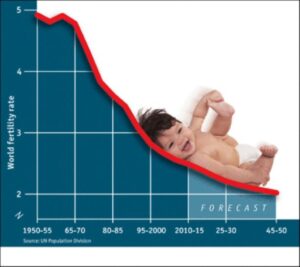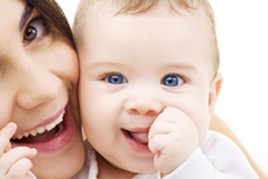Currently in Australia, one in six couples are classed as infertile, and fertility problems strike one in three women over 35. It is estimated that in 40 per cent of cases the problem rests with the male, in 40 per cent with the female, ten per cent with both partners, and in a further ten per cent of cases, the cause is considered unknown.

Male fertility is relatively easy to measure. Numerous studies have found that, on average, male sperm counts around the world have more than halved in the past 50 years and are still falling at a rate of two per cent every year. (A Finnish research team found a drop in the percentage of men with normal, healthy sperm production from 56.4% in 1981 to 26.9% in 1991, a decrease of more than 50% in 10 years! This change was accompanied by a decrease in the average weight of the men’s testes as well. Research by the University of Turku suggests environmental reasons, particularly exposure to industrial chemicals, may be behind both trends. Currently, healthy young men between 18 and 25 have only 5 to 15% normal quality sperm. In animals, the rate is 90%!) All this research only relates to male fertility, however if it is due to environmental factors, it is very likely that these factors would also affect female fertility, which is harder to measure.
The 5 big changes in the last 50 years that have impacted on fertility are:
1. Decreased Nutrients in Foods
In the wild, the fertility of animals depends on how much good quality food they eat. Research by the CSIRO showed that nutritional levels in our foods are now about half of what they were 43 years ago. So even if our diet is perfect, we might still not be getting enough of the right nutrients we need for optimum fertility. Some research indicates that those that eat organic foods, which are normally much higher in nutrients, have much higher fertility rates. Producing a baby places a huge demand on a woman’s body, and many women just don’t have enough reserves of the minerals and other nutrients that the body needs for both the mother and a baby. So having the ideal level of the right nutrients will make sure that you have the best chance of falling pregnant and having a healthy pregnancy for the full term. A pregnancy multivitamin is NOT adequate!
2. Chemical Toxins
Our bodies are exposed to hundreds of toxins every day. There are pesticides and preservatives in our food, fluoride in toothpaste, chlorine and other types of chemicals in drinking water, aluminium in deodorants, mercury in eyeliners and mascaras. Other types of makeup contain petrochemicals, etc. Also, when cockroaches and ants are sprayed there is a huge toxic exposure, there’s formaldehyde in carpets, scotch guard on furniture to stop stains, and there was an interesting report on 60 Minutes a while ago where they revealed how the fire retardants that stop clothing and upholstery from catching fire, contain deadly poisons. Some of the clothes we wear contain poisons because they’ve gone to the drycleaners, and medications also leave a chemical residue in the body. So we are regularly polluting our bodies without realising it.
The level of chemicals we are exposed to is quite surprising; for example, there are 3,000 chemicals intentionally added to food supplies. Around 70,000 chemicals are used in the US, and 65,000 of them have been classified hazardous or potentially hazardous. And over 6,000 new chemicals are developed each week! In an analysis of the breath of average people living in the suburbs, researchers detected chloroform, trichlorethane, benzene, styrene, xylene, carbon tetrachloride, dichlorobezene, ethyl benzene, trichloroethylene, and other compounds. It doesn’t take a chemist to know that these do not belong in the body.
Our systems were never designed to deal with these chemicals. Over time, the level of these toxins builds up in the body, and many of them can impact on fertility. As covered earlier, male fertility has been clearly linked to exposure to chemicals, especially lead and pesticides . In fact, fertility experts are advising all men trying to conceive to switch to organic food or thoroughly scrub fruits and vegetables to reduce their exposure to pesticides. And studies have shown that when you combine 4 or more ‘safe’ chemicals they have huge adverse effects.
3. Endocrine Disruptors
There are chemicals which are used in the manufacture of cosmetics, plastics, food cans and furniture which act in a similar way to oestrogen. These chemicals can build up in the body, and high levels are often found in human urine. According to research, these ‘Gender-bending’ chemicals, known as endocrine disruptors, could be responsible for making four out of ten men infertile . One type of these chemicals, phthalates, has been found to harm the liver, kidneys, lungs and reproductive systems as well. Two phthalates are already banned in Europe from being used in chewable plastic toddlers’ toys because of the risk to male fertility.
However the impact on female fertility is just as great. Putting chemicals into a woman’s body which imitate oestrogen but don’t work the same way, can easily throw out the delicate hormonal balance needed for proper ovulation, fertilisation, implantation of a fertilised egg, and pregnancy.
Click here for more information on Endocrine Disruptors.
4. Hormonal Imbalances
There are a number of ways that taking the Pill can affect your fertility.
It is well-known that women are tending to have babies later in life, and that age is a factor with fertility. The best way to offset this is to improve the other factors as much as possible (including the removal of any chemical build-up in the body and to optimise nutrition levels), as well as to maximise the general health of both partners.
There are a number of other factors involved in fertility that need to be considered as well.
Timing – Sometimes hormonal imbalances produce obvious symptoms, such as bloating, irritability, breast tenderness, cravings or depression. However, there can be significant imbalances that don’t produce any obvious symptoms, yet throw the timing of ovulation out. When an egg is released from the ovaries, it is only viable for 8 to 12 hours, so timing is critical when you are trying to fall pregnant. If you are ovulating too early or too late, you could be trying to conceive for years without success, so establishing when you are ovulating is very valuable.
Temperature – Sperm works best at 36.2º, which is why the testicles are on the outside of the body. In very simple terms, a woman’s temperature prior to ovulation should be around 36.2º, and after ovulation it should go up to 36.8º. 36.2º is the best temperature for fertilisation of the egg, and 36.8º is the best temperature for implantation of the fertilised egg and for maintaining pregnancy. Maintaining a Basal Body Temperature chart is an excellent way for us to check how well your hormonal cycle is working, roughly when and how well you are ovulating, and if your thyroid may be affecting your fertility.
Detox – We have seen how important it is to clear out any chemicals in the body that may be interfering with your hormonal balance and reproductive health.
Nutrition – Unfortunately, the nutrition levels in our food have decreased significantly over the last 40 years. When the body contains high levels of good quality nutrients, it naturally becomes more fertile, and a healthier pregnancy, healthier baby, and a better recovery from the birth, are all much more likely.
Circulation – However, having great levels of nutrients doesn’t help if the blood isn’t getting to the right areas. Period pain, lower back pain with your period, clots with your period, or a lower abdomen slightly cooler to the touch, usually indicate poor circulation to the uterus and lower abdomen.
Stress – Research has shown that the fertility rates for animals drop sharply when they are placed under stress. Excess stress puts the body into ‘fight or flight’ mode – if a tiger jumps out at you behind a tree, your heart rate goes up, your breathing rate goes up, certain muscles tighten, your blood sugar levels raise, and non-emergency systems in the body are shut down. This includes your digestion, immune system, and reproductive system. We don’t get too many tigers roaming in Brisbane, however what is extremely common is to see people with a build-up of accumulated stress in their body over time. This keeps their body in survival mode, instead of in ‘rest, repair and reproduce’ mode.
Natural therapists consider that a woman’s periods can reflect how well her hormones and reproductive system are working. So one of the aims of any course of treatments is to help improve her periods as much as possible, which may include the timing and length of the period, making sure the flow is not too heavy or too light, and treating any period symptoms (in conjunction with normal medical treatment).
Acupuncture
It is becoming more common for our acupuncturists to work in conjunction with medical fertility specialists whilst a woman is undergoing ART (Assisted Reproductive Technologies such as IVF, IUI and ICSI). There is continuing research about how acupuncture can assist with the effectiveness of IVF treatment, and there is also broad agreement by acupuncturists and other health practitioners about using acupuncture in these cases. Please contact our Principal Practitioner if you would like to find out if acupuncture may be able to assist in regard to your specific situation.
The outcome of acupuncture for fertility Brisbane treatments depends on the skill and expertise of the therapist, and on the methods that they use. We only use Japanese acupuncture techniques at our clinic, since when performed by a highly-trained therapist, we have found this style to be more effective that the standard Chinese acupuncture. (All of our acupuncturists were originally taught Chinese acupuncture, but since being trained in the Japanese style they now only use that method.)
Naturopathy
Naturopathy is the use of natural medicines (such as high potency supplements, herbal treatments, diet therapy, etc.) and may be able to assist with many fertility and women’s health issues. Naturopathic medicine involves looking after the chemistry of the body, including improving essential nutrition levels and reducing toxin levels. It aims to improve hormone health, as well as helping to regulate periods, cycle length and ovulation times.
Naturopaths are qualified health professionals with a 4 year degree.
If you are trying to conceive, or are looking to start trying in the next 12 months, or are going through IVF, we recommend having your nutrient levels, thyroid function, hormone balance, stress levels, internal circulation, and toxicity levels checked at our clinic. A Comprehensive Assessment, performed by our Principal Practitioner, is normally $120, but is currently available free of charge. During your Assessment, we will identify and explain to you:

1 http://www.dailymail.co.uk/health/article-158463/Why-male-fertility-decline.html
2 http://www.ourstolenfuture.org/newscience/reproduction/sperm/humansperm.htm#
3 http://www.bbc.co.uk/news/health-12634109
4 http://www.dailymail.co.uk/health/article-158463/Why-male-fertility-decline.html
5 http://www.ourstolenfuture.org/newscience/reproduction/sperm/humansperm.htm#
6 http://www.dailymail.co.uk/health/article-158463/Why-male-fertility-decline.html
7 http://www.sciencemediacentre.org/wp-content/uploads/2012/12/Sharpe12-EMBO-Reports.pdf
8 http://www.dailymail.co.uk/health/article-158463/Why-male-fertility-decline.html
9 M. Hassan and S. Killick, ‘Is previous use of hormonal contraception associated with a detrimental effect on subsequent fertility?’, Human Reproduction, 19 (2): 344-51, 2004.
10 Human Reproduction 11:1314-1317
11 J.N. Lundstrom et al., ‘Effects of reproductive state on olfactory sensitivity suggest odour specificity’, Biological Psychology, 2005.
12 Fertility and Sterility 74(4):721-72, and American Society for Reproductive Medicine (ASRM) October 2004
13 Aust NZ J Obstet Gynecol 1991:31:4:3210
Valued at $120, your Assessment will help to uncover:
All this will be fully explained to you, and you can ask as many questions as you like. That way we can be sure to give you all of the right information, understanding and advice you need. Terms and conditions: This is a free, no obligation offer.